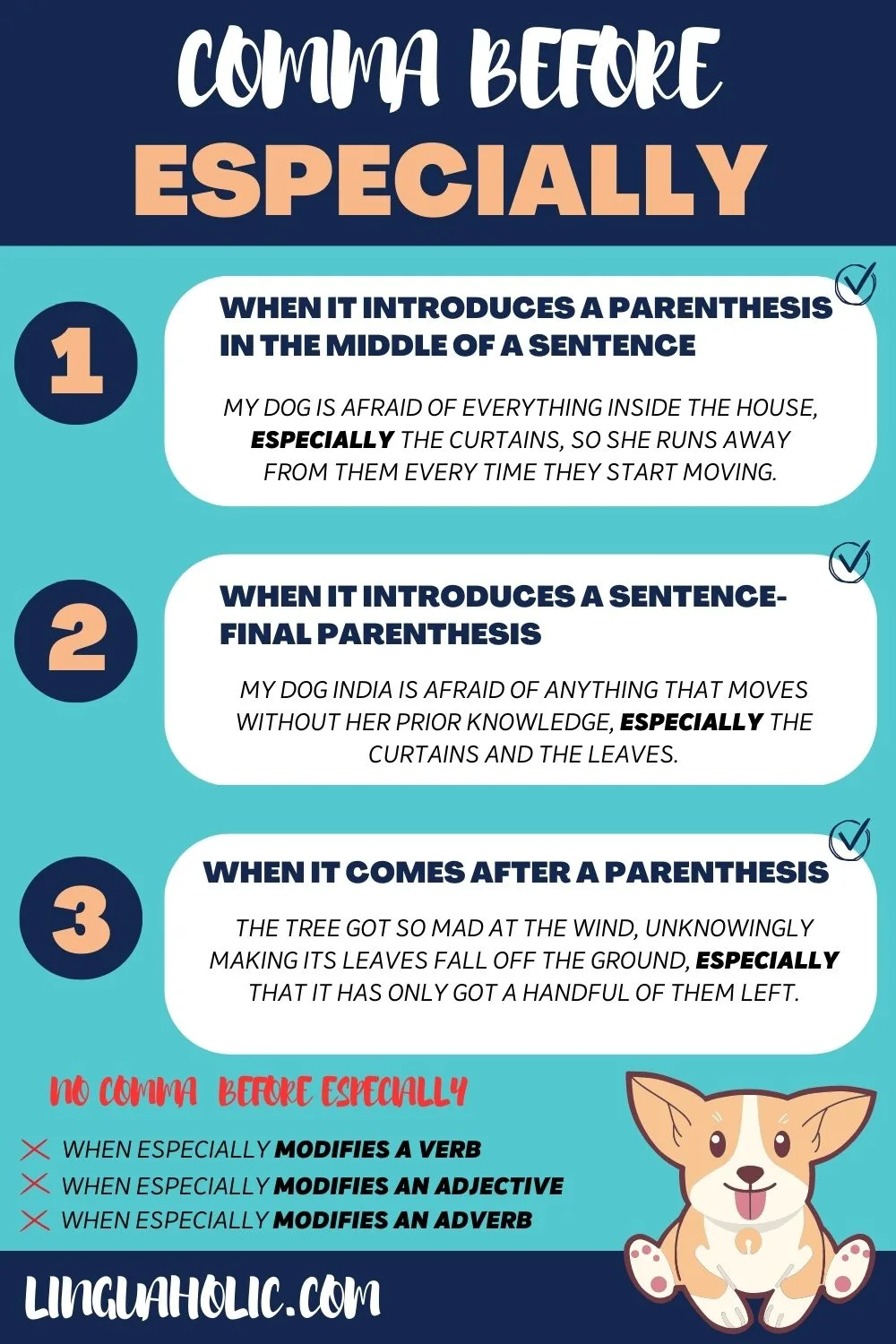“Especially” appears quite a lot in texts, and a comma sometimes appears before it, but other times doesn’t.
Why is this so? Are there rules that guide the pre-comma placement?
If you’ve reached this site because of these queries sitting apprehensively at the back of your head, you certainly came to the right place.
Let us dive right into it.
Do you put a comma before “especially”?
A comma is placed before “especially” when it introduces information that carries a parenthetical function, especially at the end of the sentence.
Adverbs whose job is to draw emphasis toward a word, phrase, or clause are called “focusing adverbs”.
These types of adverbs are important in English since they are tools for language users to improve the basic meaning of a word or an idea.
While the basic function of adverbs is to modify verbs, adjectives, and other adverbs, adverbs of focus particularly propel a reader or speaker to provide more attention to the part being modified.
In other words, an adverb like “especially” is a device we can use to put other words and ideas in the spotlight when constructing sentences.
“Especially’s” job isn’t necessarily astrophysics, right?
It rather is more of a movie director who makes sure that the actor is able to embody and express the intended emotion in the script.
Most of the time, we can observe the usage of “especially” attached by a pre-comma towards the end of the sentence.
At times, though, we don’t get to see any commas at all when it is used as an adverb in its basic function or when it is part of what we refer to as a restrictive or defining clause.
The decision of whether to place a comma or not lies within the writer’s pragmatic, syntactic, and stylistic understanding and acuity.
Now, let us go over the specific circumstances where a comma before “especially” should be placed.
Comma before “especially” when it introduces a parenthesis in the middle of a sentence
In stylistics, a parenthesis, with its plural form parentheses, isn’t those punctuation symbols that look like the legs of a bow-legged person.
It is rather a rhetorical or persuasive language tool that enables a writer to pepper his or her work with other interesting yet grammatically-dispensable details.
A parenthetical remark could be a word, a phrase, a fragment, a clause, a sentence, or even a whole paragraph.
Parenthetical elements are always set off with commas or other compartmentalizing symbols to separate and highlight their function in texts.
The use of parentheses is generally more of an informal writing strategy because they often introduce “additional” elements rather than “essential” ones.
They are like the jewelry that women wear to simply become more attractive, thereby inducing an increased sense of self-worth while splurging a hefty sum of money.
I’m kidding, but the analogy above can actually be applied in understanding this concept more deeply.
Parenthetical devices are often grammatically unnecessary, not to mention the fact that they take up a lot of line spaces as well.
Therefore, in texts, we need to use commas to mark a parenthesis’ removability, hence the insertion.
To illustrate what I’ve been trying to point out, kindly look at the example below.
Notice that the sentence above could have ended at the word “house,” but since I wanted to emphasize the object that the subject fears the most, additional details were integrated midway.
“Especially” would always need a pre-comma when used this way.
Comma before “especially” when it introduces a sentence-final parenthesis
A similar principle applies when the parenthetical information is added at the latter part of the sentence, which is oftentimes how we use “especially”.
The only difference of this structure from the former is that placing the parenthesis at the end most likely allows more information retention.
Also, remember that a parenthesis is absolutely optional rather than necessary to the sentence’s well-formedness.
Thus, when left out, the sentence should still make perfect sense, albeit becoming less interesting and detailed.
Here’s an example to illustrate the explanation above.
She’s quite a jumpy dog, isn’t she? She probably wouldn’t last a minute hanging out with Chuckie.
In the example above, the fragment “especially the curtains and the leaves” could be conveniently taken out without hurting the remaining parts.
Thus, the pre-comma is placed to help a reader distinguish this grammatical principle, as well as to emphasize the additional details.
Comma before “especially” when it comes after a parenthesis
Now that you’ve understood how parentheses work, it should be a lot easier to deduce that any information introduced by “especially” after a parenthesis needs a comma as well.
Obviously enough, the final comma of the parenthetical element should automatically serve as a pre-comma to any subsequent information introduced by “especially.”
Technically, the clause introduced by “especially” is simply just another parenthetical clause attached to the sentence to highlight a point.
This is also another reason why a comma has been inserted before “especially.”
No comma before “especially”
When “especially” modifies a verb
As stated earlier, “especially” may also function as an ordinary adverb that could act as a verb modifier.
This type of construction should not need a comma at all, particularly if “especially” and the word it modifies aren’t a part of a parenthetical expression.
Put simply, we can just think of how adverbs normally do one of their most basic tasks.
Seriously? Who would do that?
Anyways, I know you already get the point of this subsection so let’s just move on instead.
When “especially” modifies an adjective
Another popular function of adverbs is to modify adjectives, which simply works quite similar to the previous part.
The only difference is that this structure shifts the focus to the adjective rather than the verb.
“Especially” pre-modifies and draws focus on the adjective “resilient” in the sentence above.
When “especially” modifies an adverb
Lastly, at least for the three basic adverbial functions, “especially” may also be used to modify another adverb.
This time, just think of “especially” giving more emphasis on its immediate relatives, rather than the distant ones.
“Especially” modifies the adverbial phrase “on Sundays” which contains a temporal meaning.
Also, the sentence implies that although the subject may also ride her bike on other days, she finds biking particularly on Sundays extra special.
Frequently Asked Questions on comma usage before “especially”
What is a parenthetical clause?
A parenthetical clause, either dependent or independent, is used as a rhetorical device to emphasize, clarify, digress, or add humor to make a sentence more interesting.
A parenthesis may not necessarily be a clause as it can also be a word, a fragment, a sentence, or even a whole paragraph, which mainly depends on the writer’s intention.
How do we properly use “especially” in a sentence?
We can use “especially” properly just like how we use the adverb “particularly.” The role of these adverbs is to provide a focusing effect to a word, a phrase, or a clause that may function as a verb, adjective, or another adverb in a sentence. “Especially” often occurs as a parenthetical introductory element at the end of a sentence.
Is there a comma after “especially” at the beginning of the sentence?
“Especially” is an adverb that has a focusing rather than a connecting function. This means that it rarely occurs as the only element used to introduce a sentence and followed by a comma like how we use “moreover” for. The most common usage of “especially” at the beginning of a sentence that requires a post-comma as a connective device, though, is when it is paired with “most,” meaning when using “most especially.”

Hey fellow Linguaholics! It’s me, Marcel. I am the proud owner of linguaholic.com. Languages have always been my passion and I have studied Linguistics, Computational Linguistics and Sinology at the University of Zurich. It is my utmost pleasure to share with all of you guys what I know about languages and linguistics in general.


